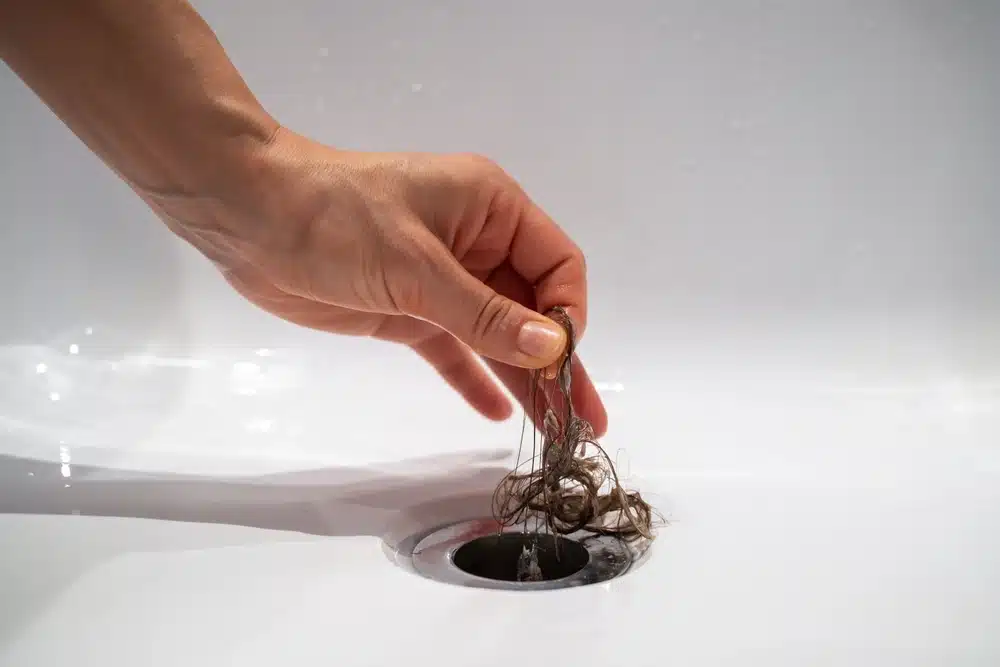It’s well understood that severe stress and malnutrition can lead to hair loss, but what about the other way around? Is it possible to have too much of one vitamin, to the point where it, too causes hair loss?
This isn’t the case with many vitamins. Vitamin C, for example, can be taken as much as possible with extremely minimal side effects, because the body will simply pass on what it doesn’t need.
Some vitamins, however, like Vitamin A, are stored in the body until its needed. This means that it’s possible to “overdose”, as it were.
Too much Vitamin A can lead to a series of problems, including hair loss. At the same time, too little vitamin A can also cause problems. To help you understand the balance, and the link between hair loss and Vitamin A, use this guide:
Introducing Vitamin A
Vitamin A is a fat soluble vitamin that’s a key part of any balanced diet. So long as you get your vitamin A solely from food and not supplements, you’re almost guaranteed to maintain a healthy balance of the vitamin. Of course, if you aren’t getting enough vitamin A from your diet, then you’ll need to get it from elsewhere, usually from a multi-vitamin.
Vitamin A Benefits
Vitamin A is essential for many different functions in your body, including your:
- Vision, particularly at night
- Immune system
- Growth and development, especially during pregnancy or throughout childhood
- Skin and hair health
Vitamin A’s Role in Hair Health
Vitamin A also plays a role in hair health [1]. It helps produce sebum, which is the natural oil that keeps your scalp and hair hydrated. It also improves healthy hair growth, and hair strength. By keeping your hair strong and scalp hydrated, Vitamin A can help prevent hair loss.
Vitamin A Toxicity
Vitamin A can lead to many problems, like:
- Nausea
- Headaches
- Dizziness
- Blurred vision
- Joint pain
- Liver damage
Worse is, you can have chronic toxicity, which leads to problems like dry skin, Vitamin A hair loss, bone pain, or even liver enlargement.
Can Too Much Vitamin A Cause Hair Loss?
Yes, chronic Vitamin A toxicity can lead to hair loss and skin dryness, which, in turn, can again lead to hair loss or shedding. You will notice other symptoms, of course, so keep track of how you feel when taking Vitamin A and use that as a gauge as to whether you should hold off on your multi-vitamins.
It’s also useful to use a hair track app if you are losing hair, since the pattern, speed, and amount can help you understand the type of hair loss you have, as well as how and if your hair loss treatments are working for you.
How Much Vitamin A Does It Take to Cause Toxicity
To reach the point where Vitamin A and hair loss can be thrown around in the same sentence together you do need to take a significant amount of Vitamin A.
The amount you need per day is very small, but even then, it depends on your age, sex, and whether you are pregnant or breastfeeding. In general, you’ll want at least:
- Men: 900 micrograms per day
- Women: 700 micrograms per day
- Pregnant women: 1200 micrograms per day
- Breastfeeding women: 1300 micrograms per day
As for how much it takes to reach toxicity levels, the general rule of thumb is that 8,000 RAE of vitamin A can lead to toxicity [2]. Individual tolerance levels to mean that this amount varies. Regardless, you don’t actually need more than that daily recommended intake per day, so there’s no benefit in trying to find a middle ground.
What Can You Do If You’ve Lost Hair to Vitamin A Toxicity?
If you’ve lost hair due to Vitamin A toxicity then there are steps that you can take to reclaim it. Just remember that if you don’t notice a difference in your hair (as in, you don’t see it returning), then you likely have another hair loss condition like alopecia areata. At that point, you’ll want to start looking more specific hair loss treatments. You can have a look at our patients gallery, for example, to see the hair transplant results we’ve given to patients just like you.
However, before you reach that stage, it is a good idea to rule out toxicity as a cause of hair loss. You can do this by:
Stop Taking More Supplements
Supplements are realistically the only way to get such high levels of Vitamin A in a day, consistently. The easiest way to start reducing your toxicity levels, then, is to stop taking the supplements. Your body will eventually use the built-up Vitamin A, and the toxicity symptoms should subside.
Switch Over to Natural Sources of Vitamin A Instead
You do still need Vitamin A, of course. In the long run, you’ll want to get that Vitamin A from your diet, since it’s very hard to reach toxicity levels through diet alone.
Are There Other Vitamins that Cause Hair Loss?
Yes, there are other vitamins that can cause hair loss, either because you have taken too much, or you’ve taken too little. In fact, vitamin deficiencies and hair loss often go hand-in hand.
Vitamin E
Vitamin E is an antioxidant, and too much of it can interfere with your blood’s ability to clot if you’re wounded, since it reduces your platelet count. High levels of vitamin E can also result in nausea, diarrhoea, fatigue, and muscle weakness. These side effects, if severe enough, can result in hair loss as well. The recommended daily intake for men and women is around 15mg. Consuming more than 1000mg per day can increase the risk of toxicity.
Vitamin Deficiencies
You can also lose hair due to vitamin deficiencies [3]. This is commonly referred to as telogen effluvium. It happens because your body has to redirect the vitamins and nutrients you get towards critical systems – namely, your organs. This pulls nutrients away from non-essential systems, like your hair, or nails.
You can experience thinning hair from any of these deficiencies:
- Vitamin B12
- Vitamin B7 (Biotin)
- Vitamin B2 (Riboflavin)
- Iron deficiency
- Zinc deficiency
What to Do If Your Hair Doesn’t Naturally Recover
Vitamin A hair loss should naturally recover on its own just by cutting down on your Vitamin A intake. It can take some time, yes, since your body needs to work through and use all that built-up Vitamin A first, but generally, it should start to grow back on its own.
If it doesn’t, then there’s a good chance that your hair loss is a separate issue, at which point you can help slow it down or even reverse it with these methods:
Start Taking Hair Loss Medications
Hair loss medication is one of the first hair loss treatment that many take. This is because hair loss medication works to slow down hair loss itself. In most cases, this is done by inhibiting the production of DHT, which chokes off hair follicles and eventually makes it impossible for hair to grow at all.
Medications don’t work for everyone, however. Thankfully, there are other hair loss treatments you can use alongside them.
Use At-Home Hair Growth Stimulating Treatments
A great way to support hair growth, regardless of what other treatment you are using, is to stimulate your scalp at home. This can be done with massages, hair oils, or even a derma roller. The point is to provide support at the source, meaning your scalp.
Stimulating treatments work to give your scalp the nutrients it needs, and also helps increase the healing response and blood flow to the area, which in turn boosts the amount of vitamins your hair has access to.
Start Making Your Diet Healthier
The best way to avoid vitamin and mineral toxicity (or deficiency) is to simply improve your diet. We can and should be getting all the vitamins that we need from our diets alone. Eating healthier by focussing firstly on vegetables, and then on the other food groups, can help you improve your health without the risk of overdoing it.
Get a Hair Transplant
If all else fails you have one final option, and that’s a hair transplant. The good news is that a hair transplant is incredibly effective when it comes to reversing hair loss. In some patients, the results are permanent. In others, you may need to repeat your efforts. In that latter case it’s because DHT or another cause is continuing to close off your hair follicle production.
Either way, a hair transplant is how you can restore your natural hairline and even thinning hair. The results can and should look completely natural, allowing you to regain full confidence in just a few sessions.
Vitamin A and Hair Loss: Key Takeaways
In extreme amounts, Vitamin A hair loss is absolutely possible. If you are experiencing Vitamin A hair loss, then you need to stop taking any supplements, switch to natural sources only, and, most importantly, start tracking your hair loss. If you keep losing hair months after you stop taking Vitamin A, it’s time to look into other options. Our team are here to help you understand your hair loss, and even restore it with transplants.
Resources
[1] https://www.ncbi.nlm.nih.gov/pmc/articles/PMC9324272/ [2] https://www.ncbi.nlm.nih.gov/books/NBK532916/#:~:text=Higher%20doses%20of%20vitamin%20A,exceeding%208000%20RAE%20per%20day. [3] https://www.ncbi.nlm.nih.gov/pmc/articles/PMC6380979/#:~:text=Only%20riboflavin%2C%20biotin%2C%20folate%2C,(FAD)%20%5B22%5D.




